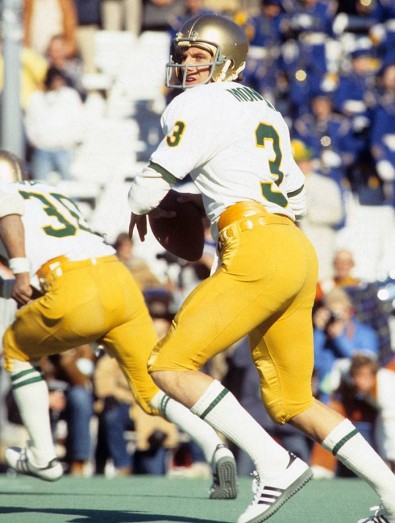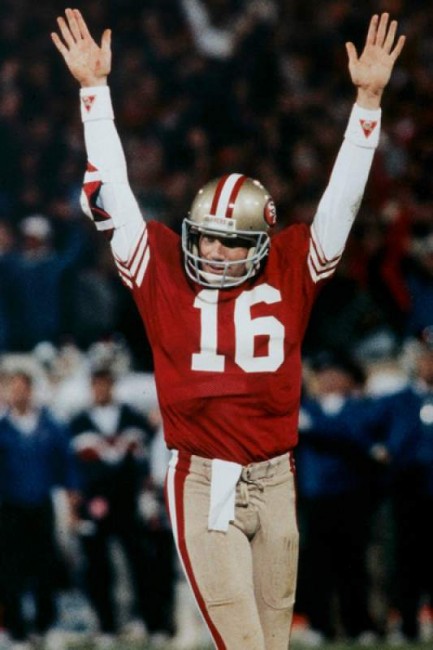He fell to the third round of the NFL draft in 1979 because he didn’t have a very strong arm and his measurables weren’t up to par with other available quarterbacks that year, but it was this player, Joe Montana, who built a resume that makes him a top candidate as the greatest signal caller of all time. “Joe Cool”, as he became known to his San Francisco 49er teammates, is the subject of our NFL 100 post today. During his college career at Notre Dame he showed flashes of his ability to perform well in high pressure situations. He didn’t become the starting quarterback until part way through his junior season, but prior to that had come off the bench to lead the Irish to comeback wins. His final collegiate game should have gotten noticed by NFL scouts, as he led Notre Dame to a win in the Cotton Bowl against Houston. Playing in frigid conditions, Montana developed hypothermia and left the game at halftime with his team trailing 20-12. He stayed in the locker room and the team medical staff gave him intravenous fluids, covered him in blankets and famously fed him chicken soup. When he returned to play, the Irish had fallen behind 34-12. Montana led a furious comeback and won the game 35-34, in what would be dubbed “The Chicken Soup Game”.

Joe Montana at Notre Dame
Despite his heroics at Notre Dame, pro scouts were not impressed with Montana at draft time. He lasted until the end of the third round, with 3 other QBs being picked ahead of him, and with the 82nd choice of the draft, San Francisco’s Bill Walsh finally grabbed him. Walsh and Montana formed a union that would transform the 49er franchise. They became a model organization, winning 4 Super Bowls, (3 under Walsh, 1 under George Siefert) while Montana was the field general. He won multiple league MVP awards, was an eight-time Pro Bowler and became the first player to win the Super Bowl MVP Award 3 times. His heroics in the biggest games were the trademark of his career. Besides having a perfect 4-0 record in Super Bowls, he also threw for 11 touchdowns in those games and was never intercepted. He led the 49ers to some remarkable victories in some of the NFL’s most memorable games, including a late drive in the 1981 NFC Championship game against the Dallas Cowboys when he hit Dwight Clark in the back of the end zone on a play that went down in NFL annals as “The Catch”, and a 92 yard drive in the final 36 seconds in Super Bowl XXIII to defeat the Cincinnati Bengals. Montana’s career heroics earned him a first ballot induction into the Pro Football Hall of Fame in 2000, and even though Tom Brady has since surpassed him in Super Bowl wins, “Joe Cool” is still considered by many to be the most clutch NFL player of all time.

Joe Montana in a familiar pose, signaling a touchdown